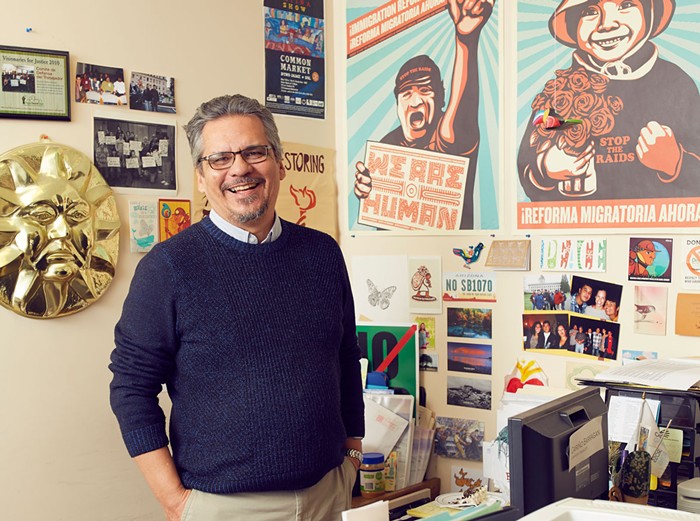Marcos Martinez has spent several decades working to raise the voices of immigrants and other marginalized groups. After a 20-year stint as a radio journalist at an NPR affiliate in New Mexico, Martinez made a home in Seattle, where he served as the director for Entre Hermanos, a nonprofit advocating for LGBTQ+ Latinx people. Today he serves as the executive director at Casa Latina, a gathering space for Latinx Seattleites to find community and professional and educational support.
With a Trump presidency looming, Martinez says his organization is mobilizing and organizing to "provide protection and prepare for whatever attacks, assaults, or insults are hurled at us." The one thing he refuses to do is sit idly by.
You've spent nearly a decade focusing on social justice in the Latinx immigrant and LGBTQ+ communities. What drew you to this work?
Queer people of color have to navigate transphobia, homophobia, and racism, so working at [Entre Hermanos] was a huge gift for my understanding of this intersectionality.
There is a racist xenophobe headed for the White House. Why is Casa Latina's work helping disenfranchised communities more important than ever?
In times of threat, it's important to gather in community, for safety and that sense of power in numbers. Casa Latina has created a space for day laborers and domestic workers to gather for finding employment, receiving education through ESL and other classes, and getting organized for better working conditions and immigration reform.
Which other organizations are doing great work in Seattle?
There are many grassroots groups providing spaces where people can come together for support and what we call "convivencia," which is like fellowship or hanging out together in community. I want to give a shout-out to the South Park Information and Resource Center, which is a small but resourceful community space.
Para Los Niños, a nonprofit based in Burien, supports the success of Latino students by working with families and helping them engage with the school system. This is a women-led organization, and I'm proud to support their work.
When you're not working, what's your go-to bar or restaurant?
I really like food, a lot, but I don't appreciate the whole foodie concept and especially the fetishizing of humble cuisines and practices that put "the best" of whatever out of reach of ordinary people. This will sound blasphemous, but I often feel like Starbucks has more diverse staff and clientele than the small independent coffee shops I see, at least the ones near where I live and work.
What do you like to read? Can you recommend a few writers?
I like speculative fiction. After the elections, I started to feel like we're living in a Margaret Atwood dystopian-future novel. I've been to readings locally by Ruth Ozeki, who also writes speculative fiction, like A Tale for the Time Being. Elissa Washuta is a brilliant local writer and essayist who writes with great insight about sexual violence, mental illness, and issues pertaining to Native people.
What's been on your playlist lately?
Mostly I listen to audio books. I don't keep up with the latest music, but I will cue up Kendrick Lamar, or when [Beyoncé's] Lemonade came out, I wore that out, or some old Grateful Dead. I did attend UC Santa Cruz in the late '70s, so...
What are you tired of people complaining about in Seattle?
The weather. Honestly, the rain makes trees grow. I moved here from the desert and drought conditions! Also, quit complaining about millennials. Young people are leading the way.
People are starting to complain about loudmouth misogynists and racists, but please don't stop complaining about that. We need an intervention strategy there. ![]()













